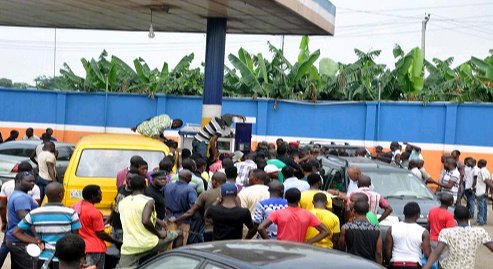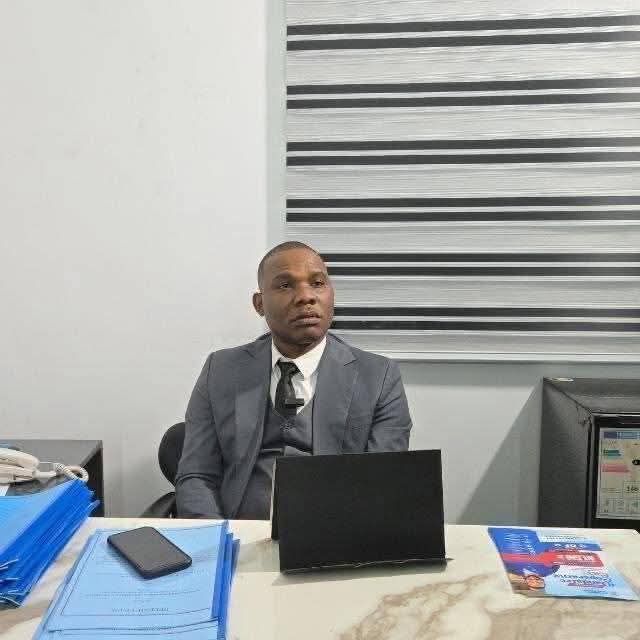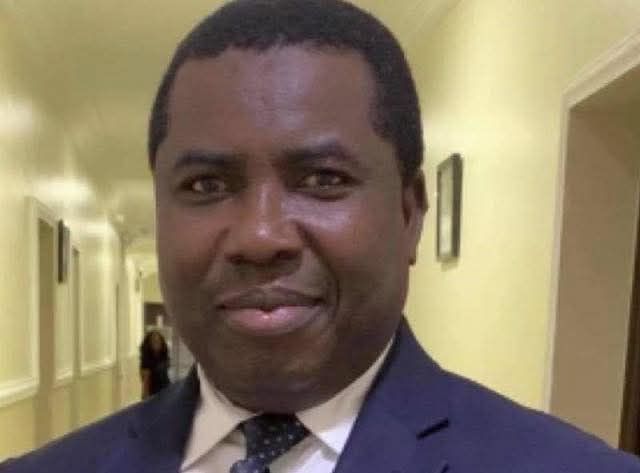BREAKING!!! Fuel Scarcity To Hit Nigeria In Coming Days, Operators Alert Nigerians, Reveal Reason.
A few weeks back, residents of the South-Eastern part of Nigeria had to endure fuel scarcity which saw the price of a litre of petrol rise above N300.
While the issue in the south-east has since been resolved, it looks like the same fate is about to befall the rest of the country if the warning issued by operators in the industry is anything to go by.
The warning was that there may be fuel scarcity in the coming days. It does not involve a warning about an increase in prices.
Fuel Scarcity Looming – Operators Warn
Supply of petroleum products across the federation may be disrupted in the coming days, as multiple challenges confront marketers, haulage companies, and their workers, operators have warned.
READ: Two Married Police Officers Caught Having S£x On Duty While Robbery Operations Was Going On
The operators, yesterday, said over 90 per cent of trucks, conveying petroleum products, are stocked in different parts of the country, especially in the Okpella area of Edo, Omuo-Ekiti in Ekiti, Maradi in Niger and some parts of Oyo, among others.
It was gathered that the site between Kabba and Omuo-Ekiti had a multitude of heavy-duty vehicles heading from the northern part to other regions stuck in a queue, spanning over 10 kilometres, immediately after Iyara in Kogi State.
According to The Guardian, those heading northward were also stranded, as it took the intervention of men of the Nigerian Army to normalise the situation.

In some portions of the road between Kogi and Ilorin, only one vehicle could move at a time owing to the deplorable state of the highway. Some haulage companies had to station towing vans at different sections to rescue trapped vehicles.
Most travelers and motorists, who avoided the Okene-Okpella expressway enroute the South-South, South-East, South-West regions and parts of the North Central on account of the dilapidated condition of the infrastructure, drove against traffic and then created gridlocks at most horrible portions of the road. Even at that, it took about two to three hours for them to find their way.
For most voyagers, who would have connected parts of the South West and Ilorin through the Kabba-Egbe- Ilorin highway, the gateway has remained a death trap.
Ilorin-Egbe-Kabba road is also affected. Apart from being totally deserted with a few heavy duty vehicles now avoiding the Ekiti path, it takes over 10 hours crossing from Ilorin to Kabba for a trip that ordinarily should not exceed three hours.
Although the route between Kabba and Lokoja is smooth, the number of police checkpoints became another concern.
There was a development where a cop shot the tyre of a trailer. In protest, the truck driver barricaded, demanding a new tyre. It took the intervention of military men, who were travelling along the axis, to restore normalcy after about an hour.
With Nigeria’s inflation rate on the upswing, experts said the prevailing situation would not only spell doom for supply of petroleum products, but also worsen poverty in the face of the free fall of the naira.
READ: See the Notorious Female Armed Robber That Sleeps With Her Victims After Robbing Them
While petroleum products are usually transported via pipelines elsewhere globally, the Nigerian scenario remained a case study.
The Nigerian National Petroleum Corporation (NNPC) had said only 38 per cent of the over 5,120 kilometres pipelines owned by the state oil company was functioning, blaming the development on vandals despite spending billions on securing the assets.
In 2018, the Director of Highways in the Federal Ministry of Works, Chukwunwike Uzo, told the News Agency of Nigeria (NAN) that the Federal Government was undertaking various road projects across the federation to the tune of N2.8 trillion.
Minister of Works and Housing, Babatunde Fashola, just last month, said the President Muhammadu Buhari administration was executing 800 contracts and 13,000 kilometres of roads and bridges nationwide.
But motorists appear not to be feeling the impact of these projects, as the Nigerian Association of Road Transport Owners (NARTO), which hauls over 90 per cent of petroleum products in the country, is insisting that its operations are seriously threatened by the decrepit infrastructure.

NARTO’s National President, Yusuf Othman, stated that the road network in the country was not only at all-time worst, but equally needed immediate intervention.
Also deploring the development, the Major Oil Marketers Association of Nigeria (MOMAN), through its Executive Secretary, Clement Isong, insisted that the bad roads were elongating delivery period and increasing the cost of doing business.
Besides, President of Petroleum Products Retail Outlets Owners Association of Nigeria (PETROAN), Dr. Prince Billy Harry, charged the government to make the pipelines work efficiently.
Vice President of the Independent Petroleum Marketers Association of Nigeria (IPMAN), Abubakar Shettima, said they were considering an emergency meeting this week over the situation.
Fuel Scarcity In South-East
Few weeks ago, residents of Nigeria’s Southeast paid as much as N500 and N600 per litre as scarcity of the product rocked the zone.
During the scarcity that lasted days, independent marketers that had the products sold petrol for between N220 to N250 per litre.
It was learnt that the scarcity was caused by industrial action by the Independent Petroleum Marketers Association of Nigeria, IPMAN. The association, since last week, shut down the supply of petroleum products in the zone over an issue between one of its members and the Imo State government.
This started when the Imo State Government, under former governor, Rochas Okorocha, in its urban renewal and expansion programme, embarked on the demolition of some properties to allow for expansion of major roads. One of the properties destroyed was a fuel station and the proprietor approached the courts claiming damages against the Imo State Government.
The fuel marketer is reported to have won the case he instituted with N100 million compensation ordered to be paid to him. He awaited the ordered compensation from Government which was not forthcoming, Sam Hart, an aide to Abia State governor, Okezie Ikpeazu narrated on Sunday.
Last week, the Independent Petroleum Marketers Association of Nigeria, IPMAN, Enugu Depot Unit appealed to South East governors to urgently wade into the lingering crisis between oil dealers and the Imo State government.
The crisis was a result of the demolition of an oil dealer’s key facility by the previous administration in Imo State.
The loggerhead was said to snowball into solidarity strikes by various arms of IPMAN, especially tanker drivers, PTDA, who banned lifting of products meant for the entire Enugu depot unit covering Anambra, Enugu, Ebonyi, and adjoining States of Imo, Abia, Benue, Kogi, and Cross River.

Rising Price Of Cooking Gas Forces Nigerians To Abandon Gas
The plan of the federal government to deepen domestic consumption of gas through the National Gas Expansion Programme (NGEP), with a target of creating about three million jobs seems to be about to be shattered, even before take-off as many Nigerians are abandoning its use.
Findings show that Liquefied Petroleum Gas (LPG) or cooking gas is now beyond the reach of average Nigerians as many have turned to charcoal or firewood, with the attendant environmental and health implications. Kerosene which used to be an affordable alternative has also hit the rooftop.
A kilogramme of cooking gas is now N625 or more, depending on the location, forcing many households and eateries, especially in urban centres to seek alternative means of cooking.
Survey done revealed that the prices of various kilogrammes of LPG have surged more than 50 per cent, with a 12.5kg content selling for N7, 800 or more, rising from N6, 500 in less than a month.
Some of the gas users who spoke to reporters during a market survey in Lagos and Akute, a suburb of Ogun State, said the situation had forced scores of poor Nigerians to resort to using charcoal-fueled stoves to cook.

Mrs. Rose Okoro, a resident of Ojodu in Lagos described as worrisome, the rising cost of cooking gas, which she said had made many go back to use of coal and firewood because kerosene was also expensive.
“With the way things are going, the cost of gas may rise to N1, 000 per kilogram by end of the year,” she predicted.
At Ketu, also in Lagos, Mrs Charity Amos, said many of her neighbours had resorted to the use of charcoal pots because they could no longer afford gas.
Mr. Benard Ojo, an artisan at Akute, said he abandoned his gas cooker for a charcoal stove. “Many of us can’t buy cooking gas anymore; government should do something about it. The price keeps increasing every day.’’
Records of gas price tags indicated that the marketers began to hike the product price from April this year, rising from around N3, 600/12.5kg cylinder to N4, 200.
By May, gas filling plants sold 12.5kg for N4, 700 while it reached N5, 000 in June and N5, 700 in early July. It was learned that those buying in lower volumes like 3kg, 5kg, 8kg, and 10kg, paid over 50 percent more than they did in March.
The latest report of the National Bureau of Statistics (NBS), had shown that the average price of a 5kg cylinder of cooking gas in August rose by 3.44% from N2,141.59 in July to N2,215.33.
The product sold higher in AkwaIbom at N3, 025.45; Benue at N2, 825.00 and Jigawa at N2, 521.43. The prices were lowest in Abuja at N1, 806.66, Ondo at N1, 840.81, and Lagos at N1, 847.70.
The average price for refilling a 12.5kg cylinder also saw an increase of 2.09% at N4,514.82 in August from N4,422.32 in July 2021 and was more expensive in Abuja (N5,837), Kogi (N5,237), and Ogun (N5,170) but the cheapest in Niger (N4,021), Kebbi (N4,042) and Jigawa (N4,079).
DO YOU HAVE ANYTHING YOU WANT TO TELL US ABOUT NIGERIA? CLICK HERE TO JOIN ESSENCE FORUM AND SHARE YOUR TOPICS WITH OVER 4000 MEMBERS.
WATCH MORE NEWS ON OUR YOUTUBE CHANNEL CLICK HERE TO SUBSCRIBE





















